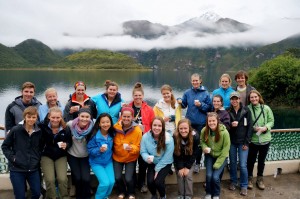Off Campus Biology Programs
The Smith Center for Global Engagement offers local to global engagement opportunities that extend St. Olaf’s liberal arts learning to communities locally and around the world. There is an application process for each of these courses. Please see the Smith Center webpage for program costs, application instructions, and additional information.
Here are a few of the Biology courses offered. Not all courses are offered every year:
Field Paleontology in Florida – Bio 131 This course explores the natural history of our planet through the fossil record. Students learn from professional paleontologists and museum curators about how fossils are used in scientific research prior to embarking on a 10-day vertebrate fossil expedition in central Florida. The students then curate, catalog and interpret their data, using a large museum reference collection. Open only to sophomores, juniors, and seniors. Offered periodically during January term.
Island Biology in the Bahamas – Bio 287
Intensive study of the biology that created the Bahamas and that now constitutes the living structure of these islands. Staying at the Gerace Research Center provides access to a diversity of marine and terrestrial habitats including coral reefs, seagrass beds, mangrove forests, hypersaline ponds, limestone caverns, and the “blue-holes” that connect inland waterways to the sea. The Gerace Research Center is located on San Salvador Island. Counts toward major: Biology. Prerequisite: BIO 150 or permission of instructor. Offered periodically during January term.
Equatorial Biology – Bio 288
This course offers intensive field-biology experiences within three equatorial New World environments: the Amazon rainforest, the Andes cloud forests, and the Galapagos Islands. Students compare the rich biodiversity, the adaptations and natural history of species, and the influence of human impact on these areas. Preparation for class requires readings from texts and primary literature concerning ecological and environmental issues specific to each of these regions. Based in Quito, the three field expeditions alternate with home-based rest days allowing for reflective writing in journals, assimilation, and discussion. Prerequisite: BIO 150 or permission of instructor. Offered periodically during January term.
Marine Ecology Research in Jamaica – Bio 289
Environmental Science in Australia and New Zealand Students gain meaningful research experience studying marine ecosystems. The course begins on campus as students develop field and analytical skills that they will apply to their research. Staying at the Discovery Bay Marine Lab in Jamaica provides access to unique coral reef and intertidal habitats where students conduct independent research projects. The course concludes on campus for data analysis and interpretation. Offered periodically during January term. Prerequisite: BIO 150 or permission of instructor.
Typically this program is offered in spring semester during alternate years, operating spring 2022, spring 2024, spring 2026, etc. The program is paused for 2026, so pleased be advised that the next possible program date is spring 2027.
This site covers all the information you will need to know about the Environmental Science in Australia Program. It includes the official information from the booklet provided by the Office for International and Off-Campus Studies and a host of photographs from previous trips.

You must be logged in to post a comment.